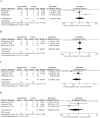Effects of Exergaming on Frailty: A Systematic Review and Meta-Analysis
- PMID: 39871670
- PMCID: PMC12037923
- DOI: 10.1111/jocn.17672
Effects of Exergaming on Frailty: A Systematic Review and Meta-Analysis
Abstract
Aim: To evaluate the effects of exergaming on physical frailty in older adults.
Design: Systematic review with meta-analysis.
Methods: Six electronic databases were searched for randomised controlled trials evaluating the effects of exergaming on frailty in older adults. Data were synthesised using narrative synthesis and meta-analysis. The risk of bias and the certainty of the evidence were assessed.
Data sources: CINAHL, Cochrane Library, Embase, PubMed, Web of Science, and China Academic Journal Network Publishing Database were searched from their inception through February 2024.
Results: Five studies (n = 391) were included. Exergaming, which was delivered in 20-36 sessions over 8-12 weeks, resulted in improvements in frailty scores and indices, frailty status, and frailty phenotypes, including exhaustion, low physical activity levels, gait speed, and muscle weakness over time. There was no effect on unintentional weight loss. Meta-analyses showed that the effects of exergaming were not significantly different from those observed in the control groups. The rate of adherence to the intervention of the exergaming group was slightly higher than that of the comparison group (87.3%-87.7% vs. 81.1%-85.4%). The overall risk of bias was high in all studies. The certainty of the evidence was very low.
Conclusion: Exergaming exerts effects on frailty comparable to those of conventional physical exercises. Participants appeared to have better adherence to exergaming. Future studies with robust designs are warranted.
Implications for the profession and/or patient care: With effects comparable to those of conventional physical exercises, exergaming could be considered in clinical settings to address frailty.
Impact: This review addressed the effects of exergaming on frailty instead of physical outcomes. Exergaming was comparable to conventional physical exercises in improving frailty scores and indices, frailty status, and four frailty phenotypes. The findings provide insights to healthcare providers on the design of exergames.
Reporting method: PRISMA guidelines.
Protocol registration: PROSPERO number: CRD42023460495.
Patient or public contribution: No Patient or Public Contribution.
Keywords: aged; exergaming; frailty; meta‐analysis.
© 2025 The Author(s). Journal of Clinical Nursing published by John Wiley & Sons Ltd.
Conflict of interest statement
The authors declare no conflicts of interest.
Figures



References
-
- American College of Sports Medicine . 2013. “ACSM Information on Exergaming.” https://healthysd.gov/wp‐content/uploads/2014/11/exergaming.pdf.
-
- Biesek, S. , Vojciechowski A. S., Filho J. M., et al. 2021. “Effects of Exergames and Protein Supplementation on Body Composition and Musculoskeletal Function of Prefrail Community‐Dwelling Older Women: A Randomized, Controlled Clinical Trial.” International Journal of Environmental Research and Public Health 18, no. 17: 9324. 10.3390/ijerph18179324. - DOI - PMC - PubMed
Publication types
MeSH terms
LinkOut - more resources
Full Text Sources
Medical

